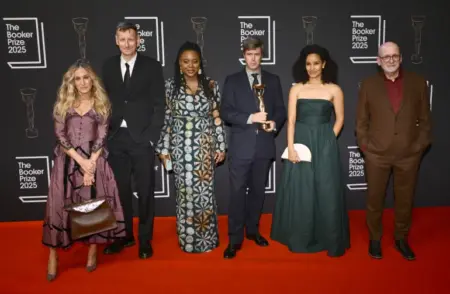Last year I split with my partner of three years, the man I thought I was building a life with. I am starting 2023 feeling a little heart sore, so I was looking forward to this Big Happiness Interview gleaning wisdom from Humble the Poet about his new book How to be Love(d): Simple Truths for Going Easier on Yourself, Embracing Imperfection, and Loving Your Way to a Better Life.
Former school teacher turned creative, Humble the Poet (also known as Kanwer Mahl) is an internationally best-selling author, hip-hop artist, speaker, designer, filmmaker, and creative consultant, with more than a million social media followers, boasting connections with likes of Pharrell Williams, Jay Shetty and Lilly Singh.
His book explores how to ‘discard old templates of love and identify challenges that prevent you from tapping into the deep reservoir of love you’ve always had within you.’
Will it help me find love in the future, I ask? ‘This book isn’t about showing you some mystical secret to finding the source of love, it’s to remind you that you’ve always been, and always will be that source,’ Humble responds.
‘It’s just that the choices we make, informed by all the things we’ve been taught and shown, can often make us forget that. Forgetting that we are the source of love has us looking everywhere else but the one place where love is experienced the most, within.’
Here Metro.co.uk talks to Humble about why loving ourselves will make us happy.
What is the connection between love and happiness?
Often, we mistake love for validation, attention, admiration, acknowledgement or pleasure. We think that validation from others will make us happy. The truth is we don’t have to find or discover or earn or be qualified for love. Love is always there.
The analogy I like to use is that love is a breeze, and the work that we have to do isn’t to find the breeze, but rather open our sails. The work that we need to do is to learn how to receive love and accept it more.
How do we change our mindset about love?
Think about the people that you love the most in your life. You could probably write a whole book on their imperfections and their flaws, and none of that disqualifies them from your love. You can write a whole book on how they’re difficult to be around but none of that disqualifies them from love. But for some reason we hold the belief that anything less than perfect disqualifies us from love.
For some reason, we hold the belief that anything less than perfect disqualifies us from love
How do we start to change that?
Self-love. Start by being your own best friend and being your own nurturing parent. It’s realising that all the love we desire from other people, we can provide that for ourselves.
All authentic connections are created through vulnerability. So, it’s really important to understand that if you want to connect with another person, you will have to be vulnerable. But it’s the same thing if we want to be vulnerable with ourselves.
Journaling is a great opportunity to be extremely vulnerable with yourself. Start with a journaling prompt, and then start to notice and observe your thoughts and feelings.
It’s good to create a better connection with yourself, but what if you feel lonely?
Loneliness isn’t being by yourself, loneliness is not enjoying your own company, or being unable to be by yourself. It’s important to learn to enjoy your own company actively in the same way that you try to develop love for somebody else. Share your interests, explore your interests, take yourself out on a date.
It’s important to learn to enjoy you own company – in the same way you try to develop love for somebody else.
How will this help us?
When we love ourselves, we’ll find love in others. When we find love in ourselves, we’ll stop looking for love in other places, and instead more love will be easier to realise. This means loving who you are now, but also loving your future.
Instead of spending time worrying about potential bad things in the future, start falling in love with an awesome future you can envision. I’m trying my best not to sound to ‘law of attraction-ish’, but it’s completely true that how we feel decides where we go.
Thinking in terms of scarcity, thoughts like: ‘There’s never enough, I’m not enough,’ will always mean there won’t be enough, and you’ll never feel like enough.
Thinking in abundance: ‘I love and am loved, and there’s plenty to go around,’ helps make that true. We always have control over our attitudes and efforts.
How do we create a better attitude and efforts about love?
If you want more love in your life, then start loving more. The act of love is what’s going to open us up to the feelings of love. We can’t control how much love we receive or experience from others, but we can completely control how much love we share and send out into the world.
This may require us to let go of old ideas like love requires reciprocity. We treat love like a transaction – ‘Give me some, and I’ll give you some,’ – when really we should see it as, ‘I share love, because I enjoy sharing.’
When we start to love others, we feel that love too, whether they reciprocate or not.
Let go of the idea that love require reciprocity.
In your book you write about self-respect. Why is self-respect more important than self-esteem?
Self-respect comes from not only recognizing and validating ourselves, but also from making tough choices that warrant that recognition and validation. That could be as simple as setting goals and doing the boring, repetitive, and often difficult work to achieve them. I’ll experience more love from waking up at the same time every day, choosing journaling over looking at my phone, and stretching, than I will receiving any type of attention or approval from anyone else.
That’s because these tough activities promote attention and approval toward myself, building my self-respect, which will always be a stronger foundation than my self-esteem. Look to how can you impress yourself more, so you spend less time chasing admiration and acceptance from others?
How can we become more confident in love?
Confidence is quiet and calm; it’s the act of being comfortable in your own skin, despite any flaws. Real confidence doesn’t come from being noticed, it comes from being better. Real confidence is modelling ongoing learning.
As Tom Bilyeu says, ‘Don’t try to be the smartest in the room, be the quickest to admit when you’re wrong.’ Confidence is a by-product of self-love, and a rejection of the validation and opinions of others. Confidence isn’t proving you’re worthy of love, it’s knowing you are, and not worrying if anyone else does. Confidence in anything requires practice, and that’s life-long practice.
Others who struggle with confidence may struggle to be around you, but that can’t be a concern of yours. Modelling confidence can inspire them to pursue the same journey.
How do we stop judging ourselves and others?
We judge because we’re insecure and we’re insecure because we judge. The more we focus on loving others without judging them, the easier it’ll be to love ourselves the same— that’s the relationship between loving ourselves and loving others. The more we realize that our judgments of others relate to our judgments of ourselves, the more we can start breaking the pattern.
Who cares if you have a Rudolph zit on your nose? You’ve seen other people with the same issue and still accepted them. We have to realise we build the walls around us, and our judgments and insecurities are bricks and mortar. Our journey of self-love is to work to judge others less and reduce how much we judge ourselves. We’ll be more fun to be around, and we’ll make more progress toward the life we want to live and the love we want to experience.
How to create a healthy relationship
Humble the Poet shares his tips:
Share experiences: Feeding the relationship new shared experiences will strengthen what you have between each other.
Don’t test each other: Save the tests for the classroom; be open and clear with the love in your life.
Value your partner: Spend more time acknowledging your partner’s strengths, and making space for them to be awesome, than tearing them down.
Intentions over expectations: Set intentions and share them with your partner so they can join you in a common direction you both can head toward.
Make time to improve your sex life: Much like the rest of your relationship, sex has to get better over time, not worse.
Forgive: Accept your partner with love and make space for them to make mistakes and have flaws, knowing they’ll do the same for us.
Do you have a story to share?
Get in touch by emailing [email protected].
MORE : I visited a manifestation coach and this is what happened
MORE : Big Happiness Interview: Caroline Goyder on why finding your voice will make you happy
‘If you want more love in your life, then start loving more.’




